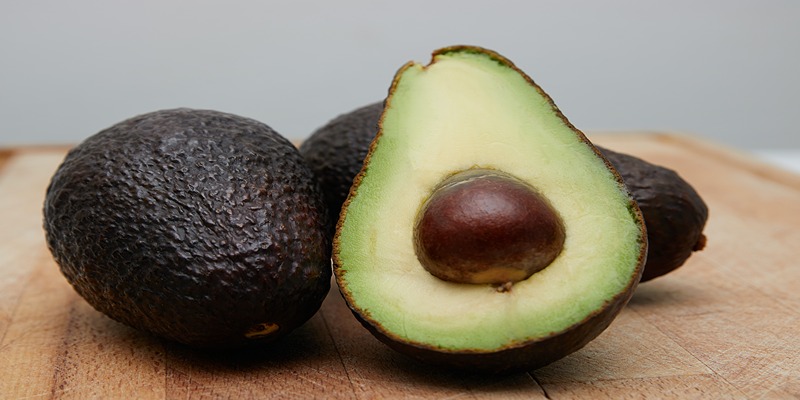A Weekly Avocado to Reduce Heart Disease Risk? Examining the Evidence
Nov 10, 2023 By Nancy Miller
When it comes to maintaining a healthy cardiovascular system, avocados have skyrocketed in popularity. These smooth fruits are a nutritional powerhouse that may help keep your heart healthy. Avocados, according to their high healthy fat content, may reduce the risk of cardiovascular disease. The versatility of these foods makes it simple to reap their advantages on a daily basis. An easy and delicious way to improve heart health is to eat avocados once a week. They're a flexible choice for anybody trying to eat better for their heart since they may be used in a variety of ways (salads, sandwiches, dip, etc.).

Dissecting Avocado's Nutrient Profile For Optimal Cardiac Function
Monounsaturated Fats: A Cardio Protector
Avocados are an exceptional source of heart-healthy monounsaturated lipids. These lipids are essential for cholesterol regulation because they reduce detrimental LDL and increase healthy HDL. The integration of avocados into one's dietary regimen will confer substantial protection to the cardiovascular system. Additionally, these lipids aid in the mitigation of inflammation, a substantial yet frequently disregarded risk factor associated with cardiovascular disease. Weekly consumption of a single avocado may potentially offer protection against cardiovascular diseases.
Potassium Content and Hypertension Management
Potassium, which is abundant in avocados, contributes to the regulation of blood pressure ideals. Unrecognized high blood pressure, also known as hypertension, is a condition with potentially fatal consequences. Potassium reduces pressure on the walls of blood vessels and contributes to the maintenance of a healthy sodium-potassium balance within the body. By reducing blood pressure and alleviating cardiac exertion, this combination is effective. Therefore, incorporating avocados into a regular dietary plan could potentially be an advantageous approach to hypertension management. Potassium, which is abundant in this fruit, potentially aids in the maintenance of a steady and healthy cardiac rhythm.
Weekly Avocado Benefits on Vascular Health
Research Insights: Frequency and Heart Health Correlation
A correlation has been established in a recent study between the consumption of avocados and cardiovascular health. Consistent avocado consumption has been associated with enhanced cardiovascular health. Plaque deposition, a substantial contributor to cardiovascular disease, is greatly reduced in the blood vessels, thereby preserving their flexibility. Avocados contain nutrients that stimulate the production of nitric oxide, which aids in the maintenance of arterial flexibility. Research has demonstrated that individuals who consume avocados on a regular basis are at a reduced risk of developing cardiovascular disease. This illustrates that avocados possess the capacity to transcend transient culinary trends and establish themselves as a fundamental component of a diet that prioritizes cardiovascular health. In order to enhance longevity and foster cardiovascular health, it is advisable to incorporate avocados into one's weekly dietary regimen.

Avocados' Role In Cholesterol Modulation
Significant effects of avocados on cholesterol levels have been observed. By including these components in your diet, you can potentially decrease your 'negative' LDL cholesterol while simultaneously increasing your 'positive' HDL cholesterol. These two lipids are both essential for preserving arterial permeability. The favorable alterations in the lipid profile have been correlated with an avocado-rich diet. Avocados are an appetizing component of a cholesterol-conscious diet that individuals seeking to lower their cholesterol levels should incorporate. By integrating avocados into one's weekly dietary regimen, there is a potential for improved lipid management and enhanced cardiovascular health.
Strategic Heart Health Diet Choices: Beyond Avocados
Complementary Foods For Maximum Cardiovascular Benefits
When included in a heart-healthy diet with other nutrient-rich foods, avocados further enhance their beneficial properties. They release a lot of healthy fatty acids, which are thought to have anti-inflammatory properties and may decrease the likelihood of arrhythmias. Regular consumption of food may effectively reduce triglyceride levels, therefore serving as an efficient preventive measure against heart disease. Whole grains also have a positive impact on cardiovascular health. Due to their high fiber content, they aid in the maintenance of optimal blood pressure and cholesterol levels. Greens such as spinach and kale are essential for safeguarding cardiovascular cells from harm caused by free radicals, thanks to their rich content of vitamins, minerals, and antioxidants.
Consuming a small quantity of nuts and seeds on a daily basis might enhance lipid profiles and enhance endothelial function due to the presence of heart-healthy monounsaturated fats. Berries that are high in antioxidants protect against inflammation and oxidative stress, which are two factors that might harm cardiovascular health. Pairing them with avocados forms a potent barrier against cardiovascular disease. Integrating a diverse range of these nutritious things into your daily diet can enhance the power of your heart and enhance your overall state of being.
Dietary Patterns to Avoid For Heart Health
Recognizing which dietary trends to avoid is just as crucial as picking the correct meals for promoting a heart-healthy lifestyle. Trans fats and salt are common in processed meals, and both contribute to the development of cardiovascular disease. Consuming an excessive amount of salt causes water retention, which in turn increases blood pressure and puts stress on the heart. Trans fats, which may be found in a wide variety of fried and baked items, have been linked to an increase in "bad" cholesterol and a decrease in "good" cholesterol, both of which play a role in the development of coronary artery disease.
High quantities of saturated fats and heme iron may be to blame for the association between heart disease and the regular eating of red and processed meats. Obesity is a risk factor for heart disease, and this condition is exacerbated by the use of sugary beverages and snacks. Also, these meals might raise glucose levels in the blood, which can be hard on the heart in the long run. Lastly, the number of fried foods in a diet might raise the risk of heart disease owing to their high calorie and trans fat content, which may contribute to weight gain and cholesterol issues.
People would do well to steer clear of these eating habits and instead prioritize a diet rich in foods that are good for the heart. Improved heart health and a lower risk of cardiovascular disease may result from a diet that places an emphasis on fruits, vegetables, lean proteins, and whole grains while cutting down on processed foods, sweets, and excessive red meat.
Practical Tips For Integrating Avocados Into Weekly Meals
Avocados are a healthy addition to any diet, but incorporating them into your weekly meal plan might take some thought and preparation. To get started, try mashing avocado over whole-grain toast or blending it into a smoothie for a creamy morning meal. Avocados are a healthy and delicious addition to lunchtime salads or soups when diced and mixed together. Guacamole and vegetable sticks make a great snack. When it's time for supper, swap out the butter or mayonnaise on your spaghetti or sandwich with some avocado. The addition of avocados to a dish improves not only its nutritional content but also its taste and texture.
Creative Avocado Recipes For Heart Health
Dishes with avocados might be a savior for your heart. Try some spaghetti with a sauce made from avocados, basil, garlic, and olive oil blended together. Avocado puree may be used in lieu of butter in brownie recipes for a unique touch. Avocados are so nutritious that you can even use them as a healthy dessert by blending them with chocolate mousse. These dishes will satisfy your taste buds and help keep your heart healthy.
Managing Avocado Intake: Quantity And Frequency
Even with healthy foods like avocados, moderation is crucial. Aim for half to one avocado every day to maintain a healthy calorie and fat ratio. This is equivalent to three or four avocados every week. Consuming food at this rate is beneficial to the heart without leading to excessive calorie intake. You may get the heart-healthy advantages of avocados without compromising your diet if you only watch how much you eat.
Conclusion
Avocados have been shown to have several positive effects on cardiovascular health, including lowering cholesterol and enhancing vascular function. When combined with other heart-healthy meals and a commitment to avoiding harmful dietary habits, this nutrient-dense fruit may have a profound effect on a person's cardiovascular health. To keep your heart healthy, remember to eat avocados in moderation and try new recipes. As long as you keep these things in mind, eating avocados may be a tasty step toward a healthy cardiovascular system.
-
 Nov 08, 2023
Nov 08, 2023Pecans Daily: Powerful Reasons to Incorporate This Nut into Your Diet
Explore the numerous health benefits of pecans, from heart health to digestion. Learn how to incorporate these nutritional powerhouses into your everyday meals.
-
 Nov 07, 2023
Nov 07, 2023Embrace the Creaminess: Top Dairy Foods with Low Lactose Content
This article provides a comprehensive list of 10 low-lactose dairy foods, offering delicious and nutritious options for those managing lactose intolerance.
-
 Nov 02, 2023
Nov 02, 2023Unlocking the Benefits of Dry Brushing: A Comprehensive Guide
Discover the art of dry brushing for radiant skin and improved well-being. Learn the right technique and reap its countless benefits.
-
 Oct 02, 2023
Oct 02, 2023Sun Poisoning: Causes, Symptoms, and Prevention
Sun poisoning involves sunburns. Learn more about it and the symptoms, causes, and prevention methods of sun poisoning.
